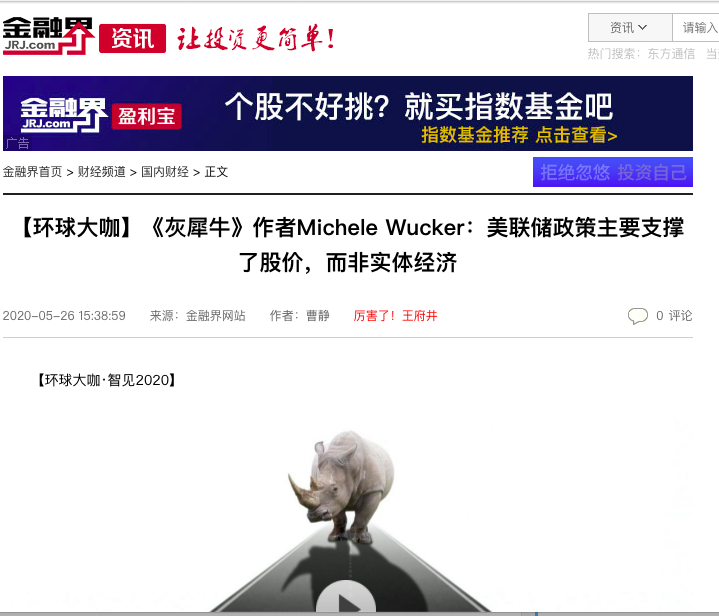The Chinese website China Finance Online recently interviewed Michele Wucker. Click HERE for the Chinese version. The original English follows below.
Q:How will the Coronavirus affect the global economy?
How COVID-19 will affect the global economy depends on a lot of “Ifs.” How long will it take to develop and distribute a vaccine? Will the virus mutate into a more or less virulent version? If people show symptoms right away, so that they do not shed virus before symptoms appear, a more lethal virus ironically could be resolved faster since “smart” viruses don’t kill their hosts. A less lethal version would spread even more quickly, but if the risk of serious illness and mortality is low enough it could allow activity to normalize. In fact, the latter is what has happened with many viruses in the past. But we also face the danger of a second, more dangerous wave this fall, like the 1918 flu pandemic that killed my great-grandfather in November 2018.
Another big question is how compliant people are in wearing masks and continuing social distancing. Scientists estimate that there has to be 80 percent compliance for mask policies to work. Compliance has been a huge problems in the United States. Too many people are in deep denial about the seriousness of the situation, are overconfident about their chances of not catching the virus, and don’t think about the risks that they pose to others. The more people comply with public safety measures in as many countries as possible, the faster individual economies and the global economy can recover. And if a vaccine is found, it needs to be widely administered. But we’ve had trouble in the United States with the “anti-vax” movement: people who refuse to believe that the benefits of a vaccine far outweigh the risks. There have been measles outbreaks because of this attitude, and I fear that too many people will refuse COVID-19 vaccinations even if one is found quickly.
Finally, the future of the global economy depends on many national public policy responses. Obviously, governments have been providing fiscal and monetary stimulus. But there is a huge range in the amount of stimulus and how it is done. The question is how much of that stimulus goes to productive investments and to supporting the people who most need help and who are more likely to use that money to buy goods and services. Monetary stimulus is needed to keep government borrowing costs low, and to get low-cost financing to businesses that need it. But if that monetary stimulus merely props up stock markets, it will continue to suck money out of the real economy and increase economic inequality -and as a result raise the possibility of social unrest on top of the serious economic problems.
The International Monetary Fund is already saying it will need to revise its estimates of how much the global economy will shrink, because it is clear that the economic damage will be more than was thought earlier. In reality, any numbers at this point are wild guesses. So are estimates of how quickly economies will rebound, except for the fact that few economists now expect a “V” shaped recovery that is quick. More expect a “U” or “L” shaped economy, or combination of the two in which there is a slow, gradual recovery. This will differ by country, because of the factors I mentioned above, and depends on the progress of medical breakthroughs in treating the disease and even better, preventing it.
Q:What do you think of the Fed’s measures such as the almost-zero interest rate and QE? Are they too aggressive?
The problem with the Fed’s policies is that there are no countervailing measures in place to offset the unintended consequences of QE and low interest rates, which continue to contribute to asset bubbles. So unfortunately the main effect of Fed policy has been to prop up securities markets. Investors who have financial assets love this, but the most urgent need in the economy is to support people who don’t have financial portfolios –especially those who have lost their jobs or businesses or are in serious danger of doing so. The returns on QE are shrinking, and at some point it will stop working and the house of cards will collapse.
Fed policy has destroyed the price discovery that is supposed to be such an important part of the market. In other words, investors are not making decisions based on the intrinsic value of securities or the companies they represent, but rather whether or not the Fed will keep printing money and buying securities. The value of shares has lost its connection to the value of the underlying assets. The Fed urgently needs a better transmission mechanism to channel money into the real economy instead of to the secondary markets which are simply moving assets around instead of helping to raise new capital.
It has created special purpose vehicles and facilities to buy investment-grade corporate bonds and asset-backed securities including mortgages. It should use that model to buy consumer debt at a discount and restructure it, and to create a vehicle to funnel money to small and medium sized enterprises, since the existing programs have run out of money quickly.
Q:Many countries around the world are at the stage of negative interest rates. What do you think of this problem? Do investors need to worry about sovereign defaults?
Negative interest rates will be useful only if they are applied to the people who need them most and companies that pass the savings on to their customers via lower mortgage or credit card rates. Simply offering negative interest rates to companies that will just keep the higher profits for themselves and shareholders will not kick-start economies fast enough.
We do need to worry about sovereign defaults. Nearly two decades ago I wrote extensively about the problem that it was too hard –not too easy as some investors suggested– for countries to go “bankrupt.” The sooner debts could be restructured when trouble looms, the less investors would lose in the end and the sooner economies would rebound. The challenge is to limit the impact of sovereign restructurings on banking systems, since governments rely heavily on their own banks to buy their debt.
Nevertheless, the biggest problem right now is not government debt –and that is saying something big because governments are pouring huge sums of money into supporting their economies and debts are growing rapidly. The biggest problem is private sector debt, both consumer and corporate. The sooner those can managed, the sooner economies can bounce back and start boosting tax revenue and bringing government budgets back into line. Nevertheless, it will take many years to pay back the debts created by the pandemic, just as it took many post-war years to reduce the debts those crises created.
Emerging and frontier market governments are much less likely to have the resources to make it through the crisis. They also are the ones least likely to have robust health systems or the resources to upgrade to clean and energy efficient infrastructure. In the aftermath of the debt crisis of the 1980s, many countries did debt-for-equity swaps. It’s time to revive that concept in a way that not only allows but encourages these countries to invest in health care and mitigating climate change. These two areas will yield significant benefits in productivity, lower health care costs, protection against future pandemics, less air pollution, and progress in reducing greenhouse gases and making the planet more sustainable.
Q:Some Chinese experts are comparing this crisis to the Great Depression and subprime mortgage crisis in 2008. What are the similarities and differences?
This is much, much bigger than the subprime mortgage crisis, and could be much bigger than the Great Depression as well in terms of jobs lost. One of the differences from 2008 is the question of moral hazard -that is, the tendency to take dangerous risks because you know you’ll get bailed out. There was a lot of judgment by Americans in 2008 of people who borrowed large amounts to buy homes they couldn’t afford, which prevented the government from providing more aid to struggling homeowners. There also was a lot of anger at the government for bailing out big banks and insurers, not holding accountable those who had made highly risky bets that went bad, and not helping ordinary Americans enough. Many people believe that anger helped lead to the rise of the anti-government Tea Party and of Donald Trump -even though, ironically, the Trump administration’s priority is to funnel money to big businesses and those of his family and friends. Today, there is a lot of controversy over companies that can access capital taking loans that were meant for smaller companies without as much access to capital. Many of those big companies are being shamed into giving back the loan money. Another danger is that, as in the Great Depression, countries erect trade barriers that make the economic shock worse. Unlike the Great Depression, central banks are not making the error of monetary policy that is too tight –though as I mentioned, I am worried that they are making other mistakes instead.
Q:Many people are worried about that Coronavirus may promote anti-globalization. Is it possible from your perspective?
I am very worried about the impact of the coronavirus on globalization. Whenever there is an economic downturn, it is too tempting for governments, particularly with populist leaders, to deflect blame away from their own mistakes and toward immigrants and trade partners. Unfortunately, we see that happening in my country even though many people disagree with those choices.
A crisis like this one is exactly the time when countries need to be working together, not pulling apart. We have to recognize how interdependent countries and peoples are. Every country’s success depends on other countries doing well too, and on global cooperation.
The Great Depression happened in part because of beggar-thy-neighbor policies that shrank world trade and hurt economies. Let’s hope that policy makers don’t make the same mistake again.
Q:Any advices for worldwide investors?
Hold on to your hats! That is, be prepared for rocky times. Remember that the markets are not the real economy –and the more central banks prop up trading in the secondary markets, ultimately the worse it will be for the real economy and will bring everything tumbling down with it. Portfolio investors should focus on markets in countries where policy priorities are on the real economy, increasing productivity, and raising all boats -not just the ones that belong to the well-connected and wealthy. Those policies also benefit direct investors, who will find many opportunities right now to buy stakes at attractive prices.
- The Gray Rhino Wrangler on Substack - January 1, 2025
- Gray Rhino Risks and Responses to Watch in 2024 - January 10, 2024
- In the Media 2023 - December 31, 2023


